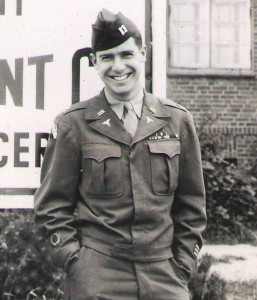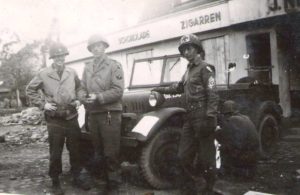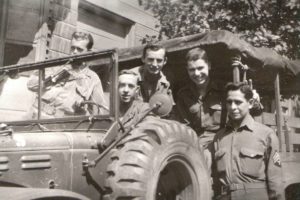
In 1999, not long after my mother’s death, my brothers and I found a box of letters with a note on top in my mother’s handwriting: “Letters to a War Bride.” The box held a collection of nearly all the letters my father wrote to her during his 20 months in Europe during and after World War II. That discovery led to a quest to uncover his wartime history which would culminate in a book I published in 2015 called “Letters to a War Bride”. My father was Captain Robert James McKay Jr. and he was Battalion Surgeon for the 275th Engineer Combat Battalion of the 75th Infantry Division. They landed at Le Havre in early December, 1944, and soon were thrown into the Battle of the Bulge on the northern flank. Here is an excerpt, from Christmas week, 1944.

23 Dec 1944 . . . We are in a country village [Chardeneux] so small that there is not even a store. It makes the last one practically seem like a city. I can’t say I mind though, because it just makes it that much less a probable target. The Medical Detachment is set up in a small barn. We have a central part with a clear floor about thirty by fourteen feet. On one side is straw stacked from the floor up with several levels on which the men can sleep. On the other side we are separated by an eighteen-inch stone and brick wall, which separates us from the stable where the cows are. Over the cows is a hayloft, which is reached by a ladder from our central part of the barn. We have rather a dim electric light (twenty five watt bulb), but our Coleman lantern gives off a pretty good light. We have our trailer with us, containing most of our supplies. Fletcher and Mirando sleep on the truck some distance away.
The old Belgian whose barn we are using is friendly and hospitable as anything. Unfortunately he only possesses a three-room house (all small) or we could have a real inside dispensary. However, the boys can go in and warm up from time to time.
Chardeneux remains a small village to this day. I spent a magical month in 2014 tracing the places and people my father encountered 69 years earlier. When I visited Chardeneux, it was clear that the whole village knows well the story of Christmas 1944, when every building in town housed soldiers of the 275th.
Christmas Eve!

It is a beautiful, clear, cold day. We have been watching the U.S. Army Air Force’s Christmas present to the German People go over and believe me, no one is unhappy about it. When you get over here and undergo the discomfort and unpleasantness of what this war has forced upon us and think of how different it is at home, you really boil. You feel that truly nothing is too bad to wish on the people who have wished this on us. I’m sure that the cold and discomfort of a winter campaign are going to make the fighting just that much more vicious. From our standpoint it is a good thing, because we have been, if anything, too easy on them.
The family whose barn we are using have invited us in to share their warm front room with them. It is certainly appreciated, because it does give us a chance to get really warm now and then. The family is farmers. There are the father, mother, and eighteen year old daughter. They are very nice, simple, straightforward, hardworking people, who are scared stiff of the war and the Germans. I can’t say that I blame them. . . .
Christmas Day, 1944
Dearest Liz: Well, Christmas Day turned out to be another beautiful clear day. Your husband, contrarily, has been in a terrible humor all day. I suspect that it’s because he is upset and fed up that he is not with you. Also there is a certain amount of nervous strain connected with this war business. . . .
The war is funny. The destruction of war is as remarkable in its absence as in its presence. The impression we have at home of a countryside completely laid waste is not true at all. There is always a great deal more time and space where it is safe than there is where it is not. . . .
Our Belgian farmer continues to be very cooperative and hospitable. Most of us are sleeping on the floor of his two small front rooms. . . . All the boys are impressed with how hard the daughter, Angéle, works.
The farmer and his wife and other old people in the town have never seen a typewriter and are now busy watching Hanna type out a requisition on it. . . .
I had hoped to meet Angéle on my visit. A Belgian friend helped me search, found the family, and the two of us paid them a visit on a lovely April evening. Unfortunately, Angéle died in 2012, but her son Marc Breda was there, living in the house where my father and his comrades once stayed. The barn my father described has been converted into a community café, but retains the original structure. Marc called Suzanne, a longtime friend of his mother, who joined us at the barn/café. Suzanne was only eight at Christmas in 1944. She remembers the chocolate the soldiers gave the children, which was momentous because they had not seen chocolate since the Germans invaded in May of 1940. And she remembers the room in her house where no civilians were allowed, which must have served as battalion headquarters that week. Small children at the time, Suzanne and a friend were able to sneak a peek and saw the walls lined with maps.
Marc disappeared into the house and emerged with a framed photo of his mother as a young woman, and another of her in later years tending sheep. As I read them the description my father had written of Angéle, Marc and Suzanne confirmed her sunny disposition, which she retained all her life. I was thrilled to make this connection to my father, sitting in the barn/café and easily able to picture it as it was, with stacks of hay filling one end and cows just on the other side of the wall.
26 December, 1944 . . . It is now nine o’clock and I have been going continuously since about seven thirty this morning. I organized an SOP (standard operating procedure). . . . Afterward I had sick call. Then went up to the front lines to see how the aid men were doing in the companies. . . . Getting back here was like getting completely out of the war. We really have it made where we are. . . .
The whole aid station gang has been watching Angéle all evening. She is spinning wool yarn with which she knits herself socks and sweaters. She has also knitted herself a dress!
A few days later, the 275th departed Chardeneux and moved to La Forge, close to the front line between Grandmenil and Hotton. On the 28th, the battalion suffered its first casualties, three men who were killed by a German machine gun while laying mines. The 275th and the rest of the 75th Division fought their way east from Grandmenil to Vielsalm and then on to Commanster.
Through my father’s letters, his memories, and my own research, I was able to trace his activities throughout the 20 months he was in Europe. I’d love to hear from anyone connected with the 75th Division, particularly the 275th Engineer Combat Battalion. I’m sure you’d be interested in “Letters to a War Bride”, available on Amazon and elsewhere. Check it out at www.letterstoawarbride.com
